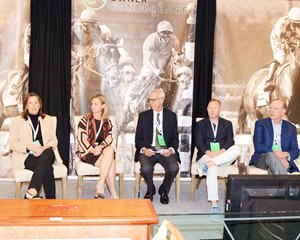Business of Ownership Discussed at OwnerView


Reynolds Bell's story of how as a teenager he helped pull a distressed foal out of its mother and saw that horse grow up to become Epsom Derby winner Sir Ivor illustrated the wonder of Thoroughbred ownership. Bell spoke Oct. 29 as part of a panel at the sixth annual Thoroughbred Owner Conference, held at Santa Anita Park as part of Breeders' Cup week.
Current and prospective owners are attending the conference, hosted by OwnerView—a program run by The Jockey Club and the Thoroughbred Owners and Breeders Association—and BloodHorse, Breeders' Cup, and The Stronach Group. The conference blends information on how to become a racehorse owner with attendance at the Breeders' Cup.
Bell, an advisor and agent based in Kentucky, was part of the opening panel Oct. 29 titled "The Business of Racehorse Ownership." Bob Curran moderated the panel, which included Gary Fenton, a managing partner with Little Red Feather Racing; Jen Shah, who leads the equine practice at the Dean Dorton accounting firm in Lexington; and Shannon Arvin, an attorney with Stoll Keenon Odgen in Lexington.
Bell cited the Sir Ivor experience as one of his most memorable in the horse business. His family sold Sir Ivor as a yearling, and the colt went on to become a European champion and win the Washington, D. C., International Stakes in this country before developing into a major sire.
Bell advised attendees on the importance of having a business plan. He suggested defining what part of the racing industry you want to be in, such as racing vs. breeding, and to determine the amount of resources you are willing to allocate to the sport ahead of time. He also recommended starting smaller than the level at which you eventually want to participate.
"I encourage people that have a plan, if it's an annual deal, to evaluate it at mid-year or at times of the year when certain things can happen that can affect the plan overall," Bell said. "You can get caught up in the excitement and disappointment of this industry. This business takes a certain temperament (because) we're dealing with living and breathing athletes. The horse itself is the beauty of this sport for me."
Fenton described how Little Red Feather creates its partnerships with the idea of making sure that every partner has fun. He said that Little Red Feather is on its 205th partnership and that thousands of people have participated over the years.
"We like to say we do all the work and you have all the fun," he said.
Fenton outlined Little Red Feather's business plans and some of the basic costs. He explained that every racehorse costs about $50,000 to $60,000 a year in training and other expenses.
"We try to be very honest," said Fenton. "I would say one in 10 make money, maybe one in 15. But we've seen the model, that one can really carry the other 14. We tell people that while we can't promise an ROI from a financial standpoint, we certainly promise it in fun and experience."
Fenton told a story about Singletary, a Little Red Feather horse who won the 2004 NetJets Breeders' Cup Mile (G1T).
Little Red Feather and trainer Don Chatlos went to see a 2-year-old in training at a Florida farm. The farm manager brought the sale prospect onto the training track, putting him in company with what Fenton called a "fluffer" horse, one not as ready who could make the prospect look good. Instead, Chatlos liked the fluffer horse and bought him for $30,000. That horse became Singletary.
The panel also included practical advice from Shah and Arvin regarding tax and legal aspects of ownership. Shah pointed out major changes to the tax code that occurred with the tax law of 2017.
She said that many clients have asked if they should convert their business to a C-Corporation, but she said that is still often not efficient from a tax perspective. She said that the biggest benefit in the new tax law has been the federal bonus depreciation.
Arvin emphasized the importance of having a team of advisors in place.
"With all of those tax matters, it's really important that the language be right in your operating agreement to be able to take advantage of those tax provisions," she said.
Arvin also strongly advised that people own horses in an LLC rather than in their individual name.
"My fear of clients owning horses in their individual name," she said, "is that the horse kicks somebody in the head, and then whoever sues wants to come back to the client and say, 'We want the right to collect all of your assets.' Whereas if you own the horse in a limited liability company or a corporation or another kind of limited liability entity, you can take the position that the only assets that are subject to any claim are those that are owned by that company."
Panels are continuing at the Thoroughbred Conference throughout Oct. 29-30. That will be followed by three days of racing at Santa Anita, including the Nov. 1-2 Breeders' Cup.
